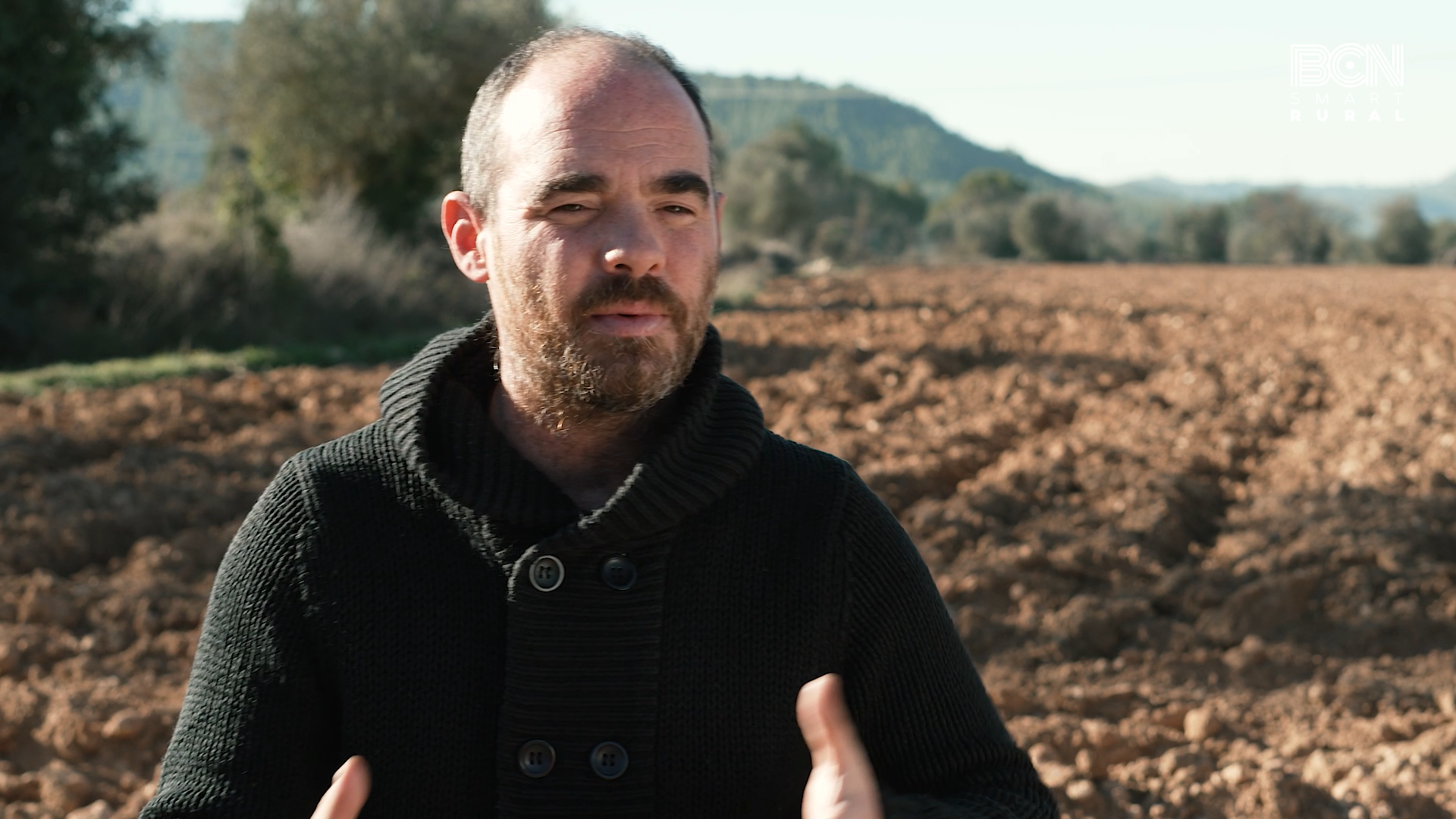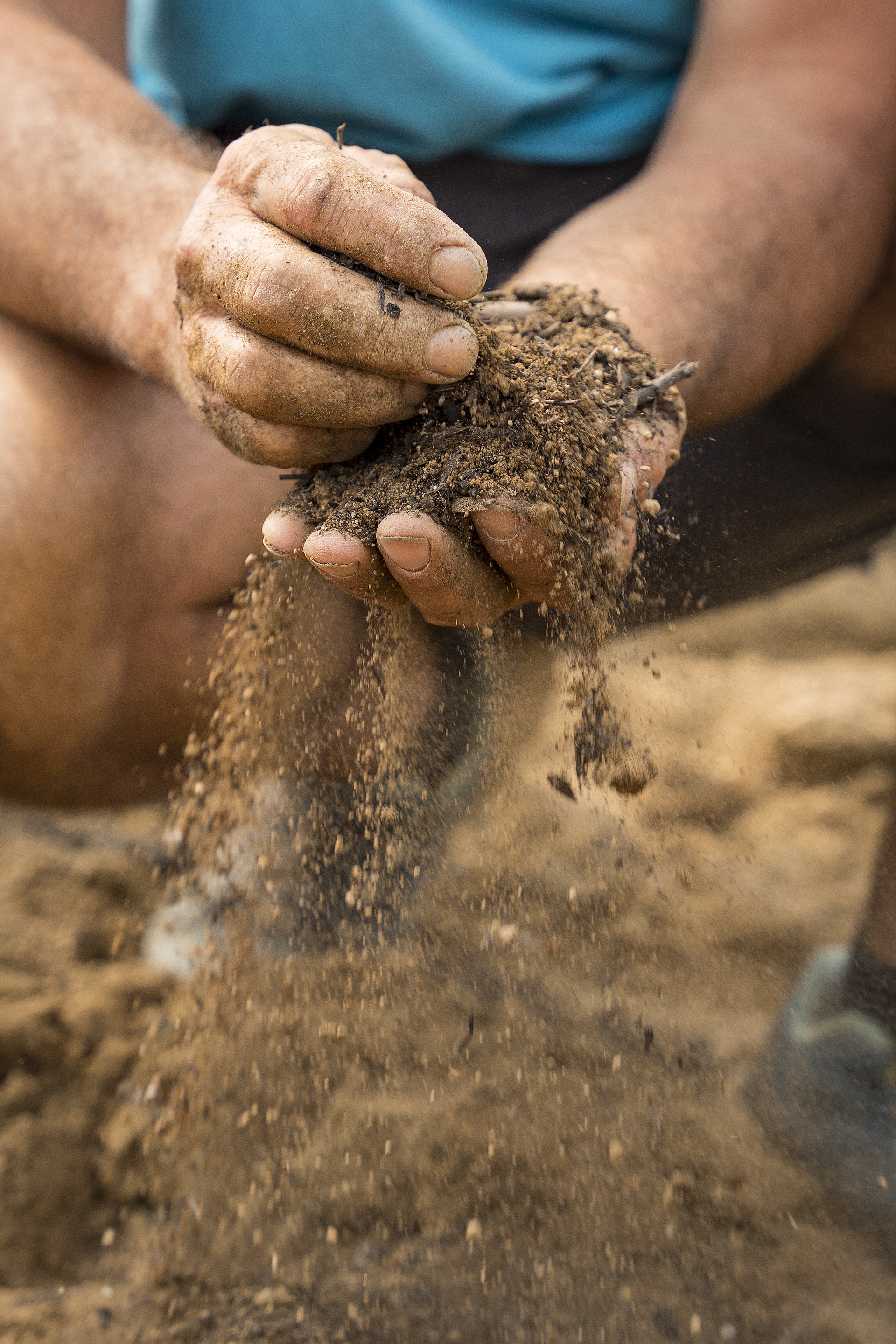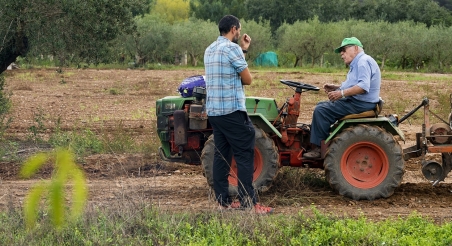Gessamí Sardà (Reus, 1979) has a degree in environmental sciences and, for five years, has been the technician responsible for the Land Bank of the Baix Camp Regional Council, an initiative born in 2017 following concerns about the abandonment of agricultural activity in this Tarragona region. The lack of dynamism in the sector triggered a collaboration between entities and institutions that was embodied in the Regional Strategic Plan for Rural Socioeconomic Development 2014-2020. The main intention of the document was to generate collaborative dynamics between the local socio-economic fabric and the councils, and, in this line, the Banc de Terres del Baix Camp was created, the first in Catalonia and one of the thirteen projects that are part of it currently of the Network of Land Banks promoted by the Barcelona Provincial Council.
Sardà knows all the ins and outs of a key tool to recover abandoned fields and attract young agricultural entrepreneurs. For this reason, he is the expert who stars in 'When the Land is a Seed', a new BCN Smart Rural Story.
To begin with, what is a land bank?
A land bank is a mediation service between owners of disused land and people who have an agricultural repopulation project and need access to the land. It is a service that seeks to reach good deals between the two parties and, to achieve this, tries to establish relationships of mutual trust.
And how exactly does this agricultural revitalization tool work? If I inherit a farm and I don't know or don't want to cultivate it, what services would I receive if I decide to offer it to the land bank?
Land banks operate through a web platform where available land is advertised. This announcement is made respecting data protection regulations so that neither the name nor the contact of the owner of the lands is provided a priori. However, people looking for plots can visit them with the technician and decide if they like them before requesting an interview with these owners. It is also possible to do the process the other way around and have the owners look at the applicants' projects and ask the technician to organize a mediation appointment between the parties that allows mutual needs to be known. The most successful conversations end up leading to a legal contract between the parties that is protected within the framework of the land bank. In this way, if at some point new needs, disagreements or conflicts arise, the technician can once again act as a mediator. In other words, it is a comprehensive support and accompaniment service offered before, during and after the signing of the contract.
Is the duration of these contracts fixed or variable?
Variable and adjusted to people's needs. There are contracts of one year and others of 30!
What are the main values and objectives of land banks?
If we talk about values, cooperation and trust between the people who are part of the land bank are fundamental. In terms of objectives, I think the most important is the regeneration of the agricultural fabric and the change in the productive model. Society wants to consume healthier, organic and local food and this desire means that more people want to undertake this adventure of being a farmer, even if they do not have land and do not come from a farming family. It is also important to emphasize that a cultivated territory is a cared-for territory and is more difficult to burn. In addition, producing food locally promotes food security in the face of unpredictable future scenarios. In other words, land banks serve many purposes.
In recent years there has been a debate about the idea of a global demand for land and possible land grabs. Is this also the case in Catalonia? Do you think that in Catalonia we have a problem of land grabbing in one corner and land abandonment in the other?
That we have a problem of agricultural land abandonment is a perceptible fact and more acute in some counties than in others: we only have to look around us to see disused fields. And it is also a fact that the best farmland tends to be concentrated in a few hands. In the case of small farming, it is an almost natural phenomenon, since, in peasant houses, the person who decides to continue working the family land and does it well, ends up receiving offers from the neighbourhood to work their fields as well. And in the case of large companies, land grabbing is done for interest, since with more arable land, production increases and profits are greater.
"The best farmland tends to be concentrated in a few hands" Gessamí Sardà
Currently, in Catalonia, there are more than 100,000 hectares of abandoned farmland. What are the reasons that there is so much unused land?
The main reason is the fact of having to sell agricultural products in a globalized market that works with ridiculous prices that do not reflect the costs and effort behind it. Moreover, much of what is paid is kept by the middlemen and does not reach the small farmers. This problem stems from the habit we have all taken of going to the supermarket to buy, since the products we find there have been acquired thanks to deals made with large producers, who can offer lower prices than a small farmer with less production. To avoid land abandonment, the price the farmer receives for the food he grows is key.
"To avoid the abandonment of land, the price the farmer receives for the food he grows is key" Gessamí Sardà
Is there a tendency to reduce the number of agricultural holdings in Catalonia?
Of course, because it is a consequence of what we discussed before: if there is more land concentrated in fewer hands, there is less agricultural exploitation. However, the fact that there are fewer owners of agricultural companies does not mean that there are fewer workers because the same hands are needed to do the work. What happens is that, nowadays, many small farmers go from being self-employed entrepreneurs and entrepreneurs to being employees of large corporations.
"Currently, many small farmers go from being self-employed and entrepreneurs to being employees of large corporations" Gessamí Sardà
What would you say should be the policy approach and the priority actions that should be implemented to address this problem?
To begin with, it is necessary to recognize the importance of initiatives that are already being carried out; for example, the promotion of local products that some administrations are carrying out is very interesting. But these campaigns must be complemented by the creation and consolidation of land banks because it is a very useful tool that guarantees access to land for people who have the most difficulty. After all, they still do not have links with the agrarian fabric of the towns and their neighbourhood. Once they have obtained the land, it is necessary to offer these people financing solutions because the initial investment to develop agricultural projects is usually significant. I know that there are currently grants for the installation of young farmers, but I think that these should be supplemented with specific grants for people with projects that contribute to reversing the process of abandonment that the Catalan countryside is suffering.
"The land bank is a very useful tool that guarantees access to land to the people who have the most difficulty" Gessamí Sardà
Do you think that the concept of the "new peasantry" is a concept on the rise? How do you see the degree of incorporation of new arrivals in the agricultural sector?
Yes, and this profile of newcomers is what we see most in the land banks of Catalonia. It is a hopeful reality because they can bring about much-needed agricultural relief. We must be aware that only people who come from peasant families and want to continue working in the countryside are not enough to maintain agricultural and livestock activity in the territory.
"Only with people who come from peasant families and want to continue working in the field is not enough to maintain agricultural and livestock activity in the territory" Gessamí Sardà
What barriers do these young people and newcomers usually encounter when starting their agricultural projects?
In areas where there is no land bank, the main problem is finding enough available plots to allow them to choose the one that best suits their project. And in areas where land banks do exist, the big difficulty is having enough money and time to boost your business. They need machinery, supplies, opening a market, etc., and satisfying each of these needs becomes a kind of crossroads that selects very harshly the people who make it and those who don't. Bearing in mind that we need a massive reincorporation in the Catalan countryside, we must provide many more facilities for agricultural entrepreneurs to succeed. The strong will of the new peasantry exists, but too often it is eroded by hardship and fades away over time. The plant must be taken care of.
"The firm will of the new peasantry exists, but too often it ends up being eroded by the difficulties and fades away over time. The plant must be taken care of" Gessamí Sardà
At the Catalan level, do you think that the land banks are a tool that is being worked well?
In Catalonia, there are local and supra-municipal initiatives that are generating a very interesting network of land banks and that is getting more and more animated thanks to the successes of the pioneering land banks. What is missing, however, is an umbrella in terms of funding, because, without money, these initiatives can be put on hold. And this can be counterproductive since the citizen must have confidence in this service and know that its continuity is guaranteed over time. Imagine, for example, that a disagreement arises between a land owner and his tenant and the land bank technician cannot mediate because funding has been suspended. We would be missing our service commitment! Therefore, it is essential that the Generalitat and the deputations, which are the institutions with the most resources, structure a line of aid to local bodies. It is good that municipalities have the initiative to create land banks, but they must be supported by institutions with more financial muscle.
Do you think that citizens should become more aware of the importance of having cultivated land?
In general, society is increasingly aware of the need for a strong agricultural sector around it, capable of producing quality food. What I am not so sure about is that the public has understood the sacrifice involved in being a farmer and the difficulties faced by people who want to start an agricultural business. I also don't think there is enough awareness of the quality of local food, especially if we compare it to what is available in supermarkets. That said, I think we are on the right track and this awareness is growing.
Outside of Catalonia, is there any land bank that particularly inspires you?
At the state level, the one I know best is the Banc de Terres del Bierzo and I consider it a very hopeful reference because it has been quite successful with a model of personalized mediation between owners and claimants, which is what we have followed in Baix Camp. The Banc de Terres de Galicia is earlier, but it operates based on public tenders and small farmers participate much less.
The Banc de Terres del Baix Camp is a pioneering project at the Catalan level and we would like to know how it is working. Did you achieve the expected results?
The Banc de Terres del Baix Camp is a success, especially if it is assessed from the point of view of the complexity of carrying out a project like this. We have secured 82 contracts in five years and, of these, there are already a few who have managed to become active farmers and others who are on the verge of becoming so. And we've also developed several really cool resources to support farmers just starting out. One of these resources that is being deployed is the Einateca, a platform able to share tractors and agricultural machinery with security and guarantees. Another is the Central Provisions, a space where production people can coordinate to make joint purchases of raw materials and thus reduce costs. In addition, an agricultural Time Bank is being implemented where you can exchange hours of work and facilitate the flow of knowledge and mutual support. There is also the media library, a virtual space where information about agricultural techniques and methodologies can be posted.
In Catalonia, what problems do councils and supra-municipal bodies currently have in preserving the rural landscape and recovering more abandoned or disused agricultural land?
As I said before, the main difficulty in consolidating the land bank model is the lack of funding. Money is needed so that the technicians who work there do not have to spend their working hours looking for financial resources to carry out the service and can focus on making this service effective.
The Network of Land Banks of Catalonia is a pioneering initiative in Europe that the Barcelona Provincial Council has co-financed since 2018 as part of BCN Smart Rural. It currently houses 13 land banks spread throughout the country, but the bulk of the actions are focused on three of the existing projects in the Barcelona districts: that of the Montserrat Rural Park, that of the Food Sovereignty Network of Central Catalonia ( XaSACC) and that of Vall del Ges, Orís and Bisaura. How do you rate this initiative?
Very positively Like all land bank projects, I know there have been difficulties in getting the service up and running, but it is now up and running and there are quite a few landowners offering their properties to the land bank. Importantly, for a land bank to be successful, it must have a sustained presence in the territory. Before the first contracts start arriving, you need to make yourself known and build relationships of trust.
— BCN Smart Rural Editorial —




